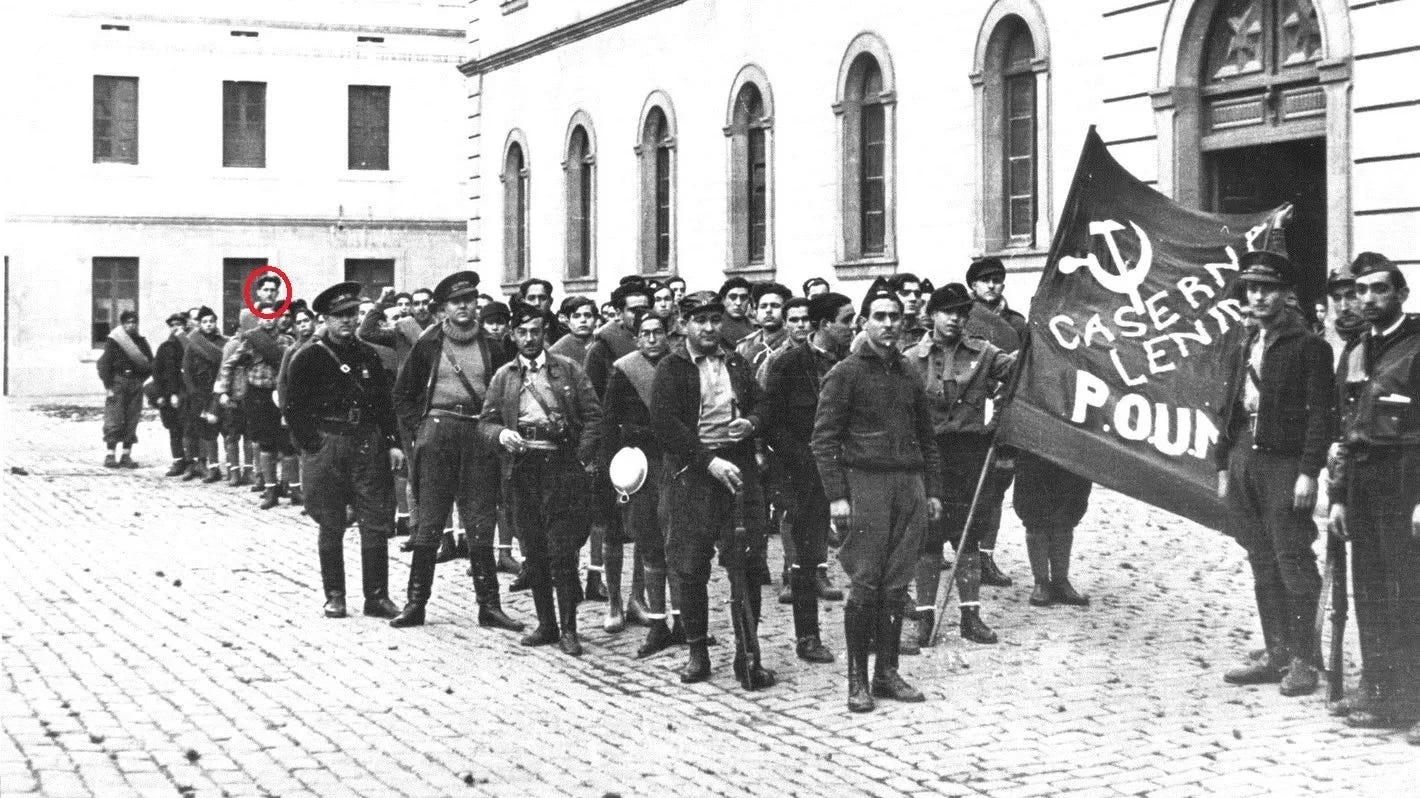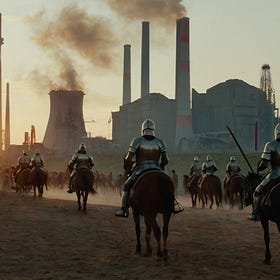If, when reflecting on the fatalities of today's culture wars, with its encroachments and infringements by self-appointed language police, we're reminded of George Orwell, of his logic of Oldspeak and Newspeak, thoughtcrime and the Ministry of Truth, it's no coincidence. Like few others before him, Orwell grasped the abysses of totalitarian thinking. He belonged to the rare species of authors who ascribe a primordial significance to the concept of truth and freedom regardless of the political climate. Hence, he states, with wonderful directness:
If freedom means anything at all, then it is the right to tell people what they don't want to hear.1
Now, the path that led Orwell to become a great defender of civil liberties is unusual in that it was driven by his transformation into a political writer and even his political activism. Because he wanted to fight fascism, the young Eric Blair (Orwell's unloved real name) went to Spain at the end of 1936 and joined the P.O.U.M. (Partido Obrero de Unificación Marxista), a Marxist splinter group fighting the reactionary putschists of Franco.
As a first-hand witness, initially, he was fascinated by the socialist spirit of optimism, with its vision of a classless society, but he soon realized that the main danger wasn't so much Franco's troops as the Stalinist-influenced Republicans, who saw the Trotskyist dissenters not as allies but as mortal enemies that had to be dealt with accordingly. Consequently, Orwell must have realized his comrades-in-arms and fellow travelers were disappearing in prisons, being tortured into making false confessions, or being summarily executed—that even his own life and that of his wife were at risk. When he returned to England, what struck him most was that even the intellectuals, who only observed the events from the gallery, had created an image of the world having nothing to do with reality but everything to do with taking sides with this or that group. This led Orwell to the bitter realization that ideological distortion is nothing more than a form of blindness:
But what impressed me then and has impressed me ever since is that atrocities are believed or disbelieved based solely on political preferences. Everyone is convinced of the atrocities of the enemy and denies those of their own side without ever bothering to examine the evidence.2
When you read the report of great battles “where there was no fighting and complete silence where hundreds of men had been killed,” it's evident that this psychopathological disorder, using Leon Festinger's concept of 'cognitive dissonance,’ is an understatement without equal. What Orwell is insisting on is that the moment you give up the possibility that there’s such a thing as truth, you surrender to a collective schizophrenia, what he later called groupthink in his dystopian novel 1984.
It is precisely against this background that Orwell's short essay, written for the magazine Polemic in 1945, should be read. If you expect an essay titled Notes on Nationalism3 to contain one of those general discussions defining nationalism as distinct from jingoism and patriotism right from the first lines, then you're in for a big surprise. Orwell points to the case of George Byron, who was forced to realize that although the English language has no word for the French longueur, it's familiar with the concept in abundance. Consequently, Orwell writes that the word nationalism is only a placeholder because:
as we shall see in a moment, I do not use it [the word] in the ordinary sense, if only because the emotion I am speaking of is not always tied to what is called a nation, that is, a single ethnic group or geographical area. It may just as well attach itself to a church or a class, or it may operate in a purely negative sense, against anything or anyone, and without the necessity of a positive object of loyalty.4
Taking this broad definition, the placeholder word nationalism stands for a form of belonging, even of community-building, in which people place themselves in a collective group and context of meaning. Orwell intuitively grasps a peculiarity that’s thrown historians like Eric Hobsbawm into an unparalleled interpretive dilemma. Despite its naturalistic references, nationalism has not always existed but was invented by modernity—and it only emerged in the era of leaflets, optical telegraphy, and mass mobilization. Thus, Benedict Anderson, who devoted an illuminating study to this invention, speaks of imagined communities – that is, communities having emerged from a collective imagination. If you believe you have an innate national character as a German, Frenchman, or Englishman, then this assertion is nothing more than a modern myth. It’s only been so successful because the societies in question have embraced a founding myth—in short, a historical misrepresentation. If, on the other hand, we situate the image of a modern mass society in Abbé Nollet's image of electrified monks, then this suggests that the real driving force of modernity is the telematic mass formation. That the nation could long appear as the institutional equivalent of this new type of society describes an ideological fade-in, the heyday of which can clearly be seen is over. For more than five decades, it's been observed that society is moving increasingly toward a world society, confirming Kant's remark that history is progressing in a cosmopolitan direction. In this sense, nationalism goes hand in hand with a misunderstanding of the actual social engine; instead, it should be understood as a phantom desire that supposedly helps overcome the phantom pain of the deep unease in modernity. From a psychological point of view, an individual feeling of emptiness is replaced by a desire for belonging, which could be understood as identity politics in its literal and futile sense. Accordingly, Orwell doesn't understand Nationalism as an acquired self-confidence but as a disturbance, even as a form of collective psychopathology. In this sense, it's always about narcissistic self-empowerment – which is almost always at the expense of the other, who must be accordingly denigrated.
But Orwell's real trick is that he splits Nationalism—itself as a placeholder word for a desire for belonging in terms of identity politics–into three forms, which he speaks of as positive, negative, and transferred nationalism. Positive Nationalism is something we're all familiar with – that exaggerated national pride filling even the humblest shoemaker when he sees himself as a member of a cultural nation, as a descendant of Goethe, Schiller & Co. – something filling him with a sense of superiority even if he hasn't read a single line about his cultural heroes. In fact, Orwell sees this self-aggrandizement impulse as the real driving force. »Nationalism,« writes Orwell, »on the other hand, is inseparable from the desire for power. The abiding purpose of every nationalist is to secure more power and prestige, not for himself but for the nation or other unit in which he has chosen to sink his own individuality.«5 Orwell's reference to the pursuit of power, prestige, and influence is particularly significant in providing entrée for what he terms negative or transferred Nationalism, which can also be linked to a form of prestige gain. When a politician like Jürgen Trittin claimed in the Leitkultur debate that demanding a certain level of language proficiency from someone seeking German citizenship constitutes forced Germanization—this is nothing more than a form of moral arrogance – an identity-political gesture of superiority Orwell would have understood as a form of negative nationalism. And because this represents a type of group formation where »the ranks are firmly closed, «as demonstrated by our Minister of State for Culture, Claudia Roth, when she joined a demonstration shouting,» Germany, you lousy piece of shit,« it's here we see the mirror image of Nationalism. In any case, the demonstrative renunciation of one's nation is associated with a claim to power and prestige. Because of this, negative Nationalism can also act as a social glue. When the British philosopher Roger Scruton tried to capture this sentiment with the term oikophobia—by which he meant the fear of one's own, which may increase to loathing—negative Nationalism's constitutive element was neglected: that denial of one's own origins can also contribute to group formation – and from here it’s only a short step to the third manifestation which Orwell calls transferred nationalism. In this case, the characteristics sorely missed in your own culture are transferred to another exotic, otherwise outstanding region of the world. So you may ascribe that the Australian Aborigines have the more profound world wisdom your own culture lacks – exoticism becomes a figure of longing.
If the transferred nationalism, as a context for projection, calls for a psychoanalytic perspective, Orwell isn't shy about linking Nationalism as a whole to the broad register of psychopathologies.
»The connections between sadism, masochism, success worship, power worship, nationalism and totalitarianism are a huge subject whose edges have barely been scratched, and even the mention of it is seen as somewhat indifferent.... Fascism is often loosely equated with sadism, but almost always by people who see nothing wrong with slavish worship of Stalin. The truth, of course, is that the countless English intellectuals who kiss Stalin's ass are no different from the minority who are loyal to Hitler or Mussolini, nor from the efficiency experts who preached "punch", "drive", "personality" and "learn to be a Tiger man" in the twenties, nor from the older generation of intellectuals, Carlyle, Creasy and the others who bowed to German militarism. They all pay homage to power and successful cruelty. It is important to note that the cult of power tends to mingle with a love of cruelty and wickedness for its own sake.«6
If we apply Orwell's insights to today's world, many of today's ideologies are spiritual descendants of what Nationalism used to stand for. Aggressive internationalism, drawing their legitimacy from the supposed overcoming of the Nation-State's limitations and Tiermondismus, dressed in a post-colonial penitential robe and authenticating its own superiority through flagellation performances, can both be understood as varieties of negative and transferred Nationalism. It isn't a coincidence that they provide their acolytes with codes and identifying marks that satisfy their lust for power, and it isn't a coincidence that armed with this ideology, they can hope for a respectable career in today's political arena. In this sense, 20th-century totalitarianism is not history; there's a danger that it’s being resurrected in identity politics. This is precisely where Orwell's placeholder word has the most significant advantage: It captures the phantasmal structure of identity politics better than any form of mass psychology. However, the greatest disadvantage of this thought costume is that it obscures our view of the engine actually driving society, the telematic logic that’s energized not only the 18th century but all of society. When Marshall McLuhan says that electrification will turn the world into a village, it is easy to overlook how the global village formula can also have the opposite effect, namely, that the village—with all its narrow-mindedness and provincialism—can rise to become the World. It's precisely this logic of self-empowerment that drives ›nationalism‹, which is the absolute opposite of what Kant intended when he spoke of a global history with a cosmopolitan intention. Identity Politics drives this; it's an avoidance of dealing with the Universal Machine of the present: wipe and gone! In essence, this is a license for irresponsibility, even for regressing into childish fantasies of grandeur: Digital Sovereignty is claimed to wallow, completely uninhibited, in prejudices and identitarian phantasms. In this context, Philosophy's dark horse Joseph de Maistre astutely asked whether anything was more terrible than a child endowed with superpowers. Which, translated into a movie scene, would be the image of a child sitting in front of an open nuclear briefcase, discovering the red button inside. With this in mind, the only thing that should be said to nationalists of all stripes is: Children, please grow up!
Translation: Hopkins Stanley and Martin Burckhardt
From a foreword of Animal Farm. See Orwell, G – Animal Farm, 1944.
George Orwell: Looking Back on the Spanish Civil War”. In: Orwell, G. – A Collection of Essays. London 1953, p. 191.
Orwell, G. – Notes on Nationalism: 1st published in Polemic, London, 1945.
George Orwell: Raffles and Miss Blandish, In: Orwell, G. – A Collection of Essays. London 1953, pp. 144-145.
Related content
Downwards!
When we speak of totalitarianism, we often conjure up this image of an all-powerful, fearsome state: a portrait of the Leviathan, drawn as a monster! Franz Neumann, the unfortunately forgotten political scientist, provides us with a structural analysis of Nazi rule that brings a very different perspective into relief – one that’s extr…
Knights of the Sad Countenance
Nietzsche made the beautiful remark: »Insanity in individuals is something rare — but in groups, parties, nations, and epochs, it is the rule.« While this assessment may be immediately obvious, it also brings a great embarrassment of thought: when Insanity becomes a mass phenomenon, it can no longer be read as such. Even worse: insofar as it’s able to d…











Greetings Martin. I’ve been on Substack for a few weeks, and I really enjoy seeing your posts pop up on my feed.
So I thought I’d drop a comment, and introduce myself, as you might like one of my articles!
https://open.substack.com/pub/jordannuttall/p/ritualistic-symbolism?r=4f55i2&utm_medium=ios